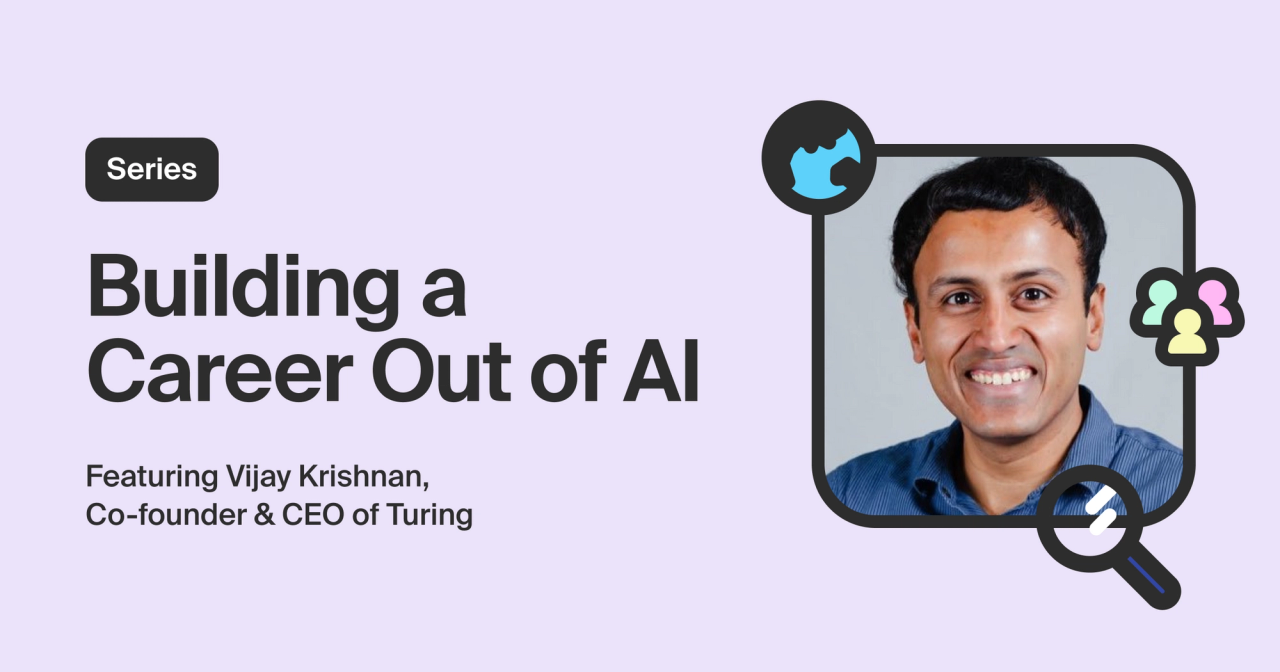As part of our Data Brown Bag series at Common Room, we were excited to host Vijay Krishnan, AI expert and current CTO of Turing. Vijay shared with us his career journey and how he chose artificial intelligence as a specialty. We also discussed what inspired him to found Turing and Rover and the interesting technical challenges he is solving today.
Neha: How did you choose artificial intelligence to be your key research area? Did you have any idea that AI and machine learning would become so popular?
Vijay: When I started grad school at Stanford back in 2005, AI was not the most popular specialization. Databases and Systems were more popular.
In my undergraduate days, I was interested in Computer Science areas with some mathematical depth, like graph theory and approximation algorithms. Those areas were quite theoretical, and I distinctly remember my dad nudging me toward applied areas.
I found machine learning (ML) to be a good sweet spot because of its mathematical depth, deep connections to probability and statistics, and also because it could be applied to many cool practical problems like email classification, search, etc., even 20 years ago.
Neha: How did you venture from being a researcher to being an entrepreneur? What did you focus on at each of the companies you founded?
Vijay: I started my last company, Rover, almost right out of grad school at Stanford. We started off as a personalized search engine. Those were the days when search capability was very limited in web browsers, and it was hard to get back to the content you had viewed in the past. We later moved our focus to personalized content discovery — recommending content to users based on other content that they had liked.
After our first startup’s acquisition, my co-founder and I took a break and then started Turing some months later. At Turing, our goal was to ease the interview process for both candidates and organizations by providing an AI-based interviewing and hiring marketplace.
We started Turing in 2018, long before the pandemic would make our work even more important. We had worked with some incredible remote software engineers, and it was very clear to us that solving effective remote hiring would be a huge superpower for companies who were struggling to hire locally.
We knew that the total addressable market (TAM) was really large (in the $300 billion – $1 trillion range). We had no idea how many companies would come onboard in the early days, but we clearly understood that given the shortage of knowledge workers available locally, we were bound to find enough early adopters. And that’s precisely what happened. The market was becoming increasingly open to the remote model, even pre-pandemic, but the pandemic turbocharged this to unimaginable levels.
Neha: What does Turing do exactly?
Vijay: Turing provides software developers the ability to live anywhere in the world and still be plugged into the world’s best job opportunities. In addition, Turing enables companies to hire the best talent from all over the world and collaborate with them effectively, rather than only sourcing candidates from a narrow pool of developers that happen to live close to their offices.
Neha: How is Turing “AI-first?”
Vijay: AI is the key tenet on which Turing is built. We have two million registered software developers from all around the world. Similarly, we help hundreds of partner companies with their software developer hiring needs. Since we have so many developers going through our vetting process — not just for technical skills but also soft skills — we can use all of this data and build accurate models to understand candidate behavior and competencies.
Today, we do multiple tests to understand candidate competency. They include computer science fundamentals and knowledge of various tech stacks. We also test for soft skills, leveling, XFN collaboration expertise, and project and technical leadership. Developers need to spend a few hours on our tests, and if they perform well, they open themselves to the world’s best job opportunities for many years to come.
Companies are then able to hire software developers after spending no more than 2–3 hours talking with a couple of candidates that Turing recommends to them. This timeline is a stark contrast to the 50–100 hours of work that it typically takes to close one candidate in an organization (10–15 onsite interviews of five hours each, two offers, one offer accepted.) What we bring to the game for organizations is speed to hire, quality hiring, and reduced costs. Most of our interviews and match-making are done via data and AI.
Key problems we solve using AI include ranking for match-making, supply management, operations efficiency, predicting who is likely to get a job, and building test result prediction using partial data. We started with simpler logistic regression-based models, then moved onto non-linear models, and are now experimenting with transformer-based models.
Neha: Tell us more about how you built your data science team.
Vijay: At Turing, we have a 1:1 ratio of product engineers to data team members (including analytics, data engineering, data science, machine learning, and product analytics), which is unusual for most organizations. In addition to core machine learning work, we heavily use data science in all functions, including growth marketing, product, operations, sales, content, SEO, etc., and have benefited hugely from this approach.
Neha: Any advice for incoming data science and AI candidates?
Vijay: One piece of advice to all incoming DS and AI candidates is to understand the fundamentals of AI, such as gradient descent, model measurement, and basic regression, and also understand the practicality or application of that work to business.
Neha: Thank you for joining us, Vijay!
To see the Common Room data team’s work in action, check out our intelligent community growth platform. You can get started for free or request a demo for more information on how to activate your community.
